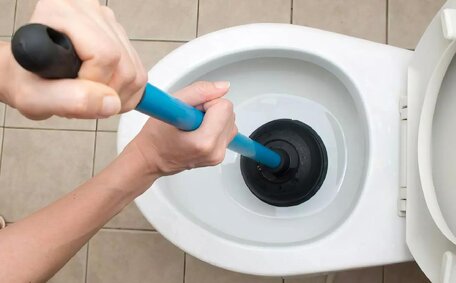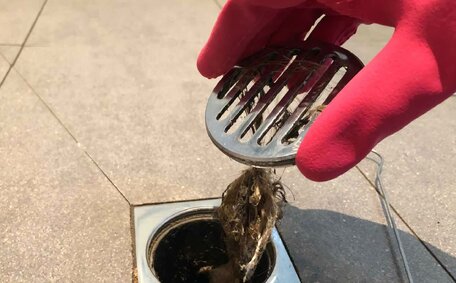
How to Prevent Household Blocked Drains
Blocked drains can be prevented by using drain strainers, avoiding pouring oils down drains, clearing hair from drains, and more tips from Seven Hills Plumbing.
Read MoreCommercial kitchen drains can easily become congested with grease, oil, fats, and food remnants. Substances like fats oils grease accumulate over time and solidify, clinging to the inside of pipes and impeding water flow. Cafes, restaurant bar venues, and Sydney restaurants may encounter frequent hindrances from these usual suspects of drain obstruction:
Without proper grease trap maintenance, commercial kitchens can frequently experience drain buildup. Stoppages disrupt kitchen workflows and can cause plumbing complications, especially hygiene issues from water accumulation on floors, underscoring the necessity of routine down pipe maintenance. Swift measures to fix blocked pathways and planned maintenance are vital in avoiding plumbing problems.
In commercial kitchens, clogs can rapidly result in slow drainage, unpleasant odours, and the substantial hazard of sewage backup if not promptly addressed.
There are a few key signs that your establishment may soon wrestle with a blocked drain. Being vigilant and recognising early warning signs allows businesses to arrange drain maintenance before a serious clog occurs.
The most common early signs include:
Although drains may handle moderate amounts of fats, oils, and scraps, accumulation over time can create a semi-solid mass that obstructs the pipes. Spotting problems swiftly allows for a speedy fix when you use plunger or mechanical snake prior to a full blockage materialising.
Ignoring these subtle signs can lead to larger obstructions, risking damage to sink pipes and impacting plumbing systems in both commercial premises and homes. A complete blockage can halt drainage completely, causing sink overflows or foul water leaks onto floors, which disrupt kitchen operations and create serious plumbing issues. Proactively maintaining your plumbing system will help prevent blocked pathways and subsequent disruptions.
It’s necessary to set up grease traps designed to expertly manage drains in commercial establishments such as eateries and coffee shops, capturing fats, oils, and food waste effectively. It’s prudent to install grease trap, serving as essential components of the plumbing system, designed to catch grease and solid materials.
Selecting the appropriate system for managing oils and grease necessitates pondering over factors most likely to affect trapping efficiency:
Traps should be located as close as possible to your sink and fixtures where grease is generated, ensuring the integrity of the sewer system. Most grease traps integrate seamlessly with your existing drainage system, situated below ground level and connecting to drain pipes outside your main premises before merging with the main sewer line. An access point allows the grease layer to be cleared during routine cleaning.
Ideally, there should be no delay in installing grease traps during construction or significant renovation when plumbing is exposed. Retrofitting existing restaurants involves cutting an access point into concrete floors which can increase expense.
After installation, training your staff to effectively remove food remnants, fat, oil, grease, and other solids by scraping plates before washing is essential. Sink strainers, also known as drain covers, additionally snag food remnants. Consistent maintenance of your grease traps works to clear your pipelines, preventing blockages.
Ultimately, Investing in proper grease and waste management protects against drainage problems and safeguards long-term plumbing functionality. Consulting with a professional plumber Sydney can offer can help you determine the optimal grease trap for your kitchen.
Effective grease trap maintenance will ensure your restaurant and cafe drains stay clear. As ruled by the '25% rule’, Commercial drain Traps require cleansing when the amount of fats oils grease (FOG) accumulation and solids hit the quarter-depth mark of the entire trap.
Ideally, staff should check and measure grease levels daily using a dipstick. As a minimum, cleaning should occur every two to four weeks depending on usage to prevent the 25% maximum.
Cleaning involves:
If necessary, authorised liquid waste contractors can deep clean traps using a vacuum truck, ensuring legal disposal of removed grease.
Regular trap maintenance prevents grease from entering main drains where it solidifies, causing blockages that compromise plumbing efficiency. Neglecting regular cleanings risks under sink leaks, the emergence of foul odor, and subsequent issues within the drainage system on your property. A clean, functioning trap is essential.
Educating your team is a fundamental step for restaurants and coffee shops to prevent drain stoppages through correct waste disposal practices. Employees should understand how their actions, such as what goes into the sinks, directly impact your plumbing.
Key areas to cover in training include:
Ensure the use of proper techniques keeps your drains flowing freely. Emphasise the significance of ensuring your drains remain unobstructed to prevent consequences that could distress your customers, like unwelcome smells, overflow incidents, pests, and operational disruptions. Emphasise that prevention protects plumbing and reduces expensive repairs.
Refresher training should be carried out with consistency to reinforce exemplary practices. Drain-friendly habits keep kitchen operations smooth while protecting pipes.
For severe drainage issues threatening your business operations and beyond simple in-house resolution, please call professional plumbing services.
See our range of comprehensive expert services at Seven Hills Plumbing, specialising in commercial kitchen plumbing, encompassing solutions such as:
With no call-out fee, our dedicated team stands ready 24/7 to address your emergency plumbing concerns and conduct diagnostics and repairs with minimal disruption. Our high-tech gear, including electric eel machines and conducting detailed CCTV surveys, is utilised during the unblocking and maintaining of drains.
For establishments experiencing recurring blocks, consistent foul odours, or water gathering around drains, a thorough camera inspection may reveal the need for repairs, replacements, or pipe relining.
Seven Hills Plumbing handles all other restaurant plumbing needs from leaking pipes, broken fixtures and gas leaks through to comprehensive water heater servicing, maintenance, and expert drain relining.
With more than 25 years of commercial plumbing expertise, we can promptly solve any drain problems ensuring kitchen operations resume smoothly.
Contact our friendly, experienced team today on 1300 349 338 or email [email protected]
For food service establishments such as restaurants and cafes, compliance with local and national plumbing regulations on proper drainage and waste disposal is essential. Non-compliance can lead to heavy fines, legal prosecution and loss of operating licences.
In Seven Hills, Sydney, businesses must adhere to rules set out in the Plumbing Code of Australia and state Environment Protection Acts. Key responsibilities include:
Breaching regulations by allowing fats or solids to enter public drains can damage the environment and potentially incurs large fines. Fatbergs and sewer overflows causing environmental contamination lead to prosecution.
Proactive grease trap maintenance, staff training on proper waste disposal, and arranging professional drain servicing enable restaurants to maintain compliance. Preventing blockages also avoids emergency callouts and closures.
Upholding local drainage rules preserves plumbing integrity, environmental standards and business reputation.
Blocked drains can be prevented by using drain strainers, avoiding pouring oils down drains, clearing hair from drains, and more tips from Seven Hills Plumbing.
Read MoreNoticing signs of a household blocked drain like slow drainage, gurgling sounds, foul odours or overflowing water indicates you need an emergency plumber. Call Seven Hills Plumbing to dispatch a plumber to clear your blocked pipes before further damage.
Read MoreRestaurants and cafes frequently deal with blocked kitchen drains due to grease, fat and food buildup. Prevent clogged pipes through scraping plates, using drain strainers and avoiding pouring fats/oils down sinks. Or call a professional plumber to hydro jet pipes and permanently clear blockages.
Read MoreSeven Hills, 2147 NSW
We will call back as soon as possible.




